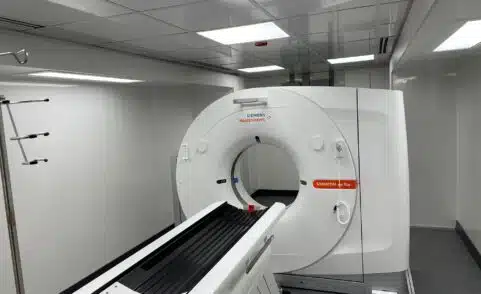
Should You Be Screened For Lung Cancer?
With low-dose computed technology (CT), we at RAYUS Radiology (RAYUS) in Springfield now have an effective method of screening for lung cancer. A low-dose CT is a painless exam that can find even the tiniest of lung nodules long before they cause symptoms. This annual screening can help detect lung cancer at its earliest most treatable stage. Earlier treatment can help save lives.
Are You Eligible to Have a Screening?
You are eligible if you:
- Are 55 – 80 years old (55-77 for Medicare)
- Are a current smoker
- Are a former smoker who has quit in the past 15 years
- Have a history of at least 30 pack-years* of smoking
* Pack-years means: (number of packs smoked per day) x (number of years smoked). For example, a person who smoked two packs of cigarettes per day for 20 years has a history of 40 pack years of smoking. This person would be eligible for lung cancer screening.
You may also be eligible if you:
- Have been exposed to asbestos
- Have been exposed to other occupational hazards like silica, cadmium, arsenic, beryllium, chromium, diesel fumes, nickel, coal smoke or soot
You are not eligible if you:
- Have signs and symptoms of lung cancer
- Have been treated for lung cancer
- Are unable or unwilling to undergo treatment if lung cancer is found
Should You Get Screened?
Approximately 85% of lung cancer is attributed to smoking. If you are a current smoker or have a history of smoking then talk to your health care provider. Exposure to certain occupational hazards (those listed in the eligibility requirements above) also increases your risk. Your doctor or another qualified provider must evaluate you and provide a referral for lung cancer screening.
If you are interested in taking an online assessment the American Lung Association tool may be helpful or check out University of Michigan Should I Screen tool which is recommended by the American College of Radiology.
Are There Risks to Being Screened?
In three of every 10 people, the screening will find a minor abnormality, but most of these are nothing to worry about. Some people will need further testing or procedures to confirm this. These tests may require more time and expense. Occasionally, a biopsy is needed. The exam uses radiation to capture images, but radiation exposure is a very small health risk for people older than 55. You should discuss these risks with your health care provider.
Is the Screening Covered by Insurance?
Most insurers and Medicare will cover the cost of lung cancer screening as long as you meet the eligibility criteria. We encourage you to check with your insurance provider before having the CT scan.

